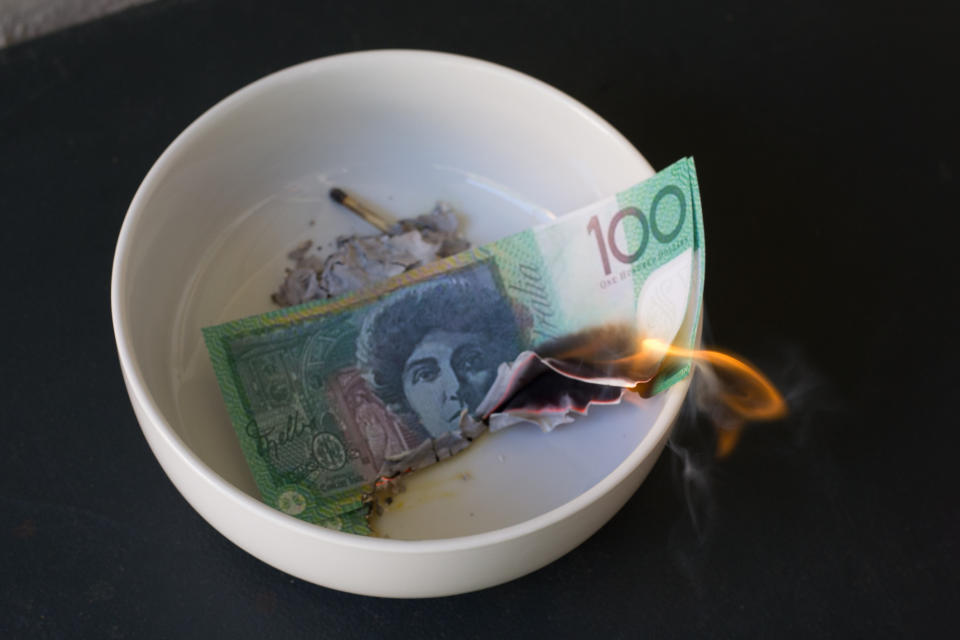Paying $10k in cash? Under proposed laws, that could make you a criminal

Cash transactions of more than $10,000 could soon mean jail time and thousands of dollars in penalties under a proposed law designed to crack down on money laundering – but the proposal is facing backlash from several groups who argue that it goes “a step too far”.
Australians could face up to two years’ jail time and/or a $25,200 penalty for paying $10,000 or more in cash for goods and services under the Currency (Restrictions on the USe of Cash) Bill 2019.
Instead, transactions of such a size would have to be made in electronic form or by cheque.
The measure is designed to tackle tax evasion, money laundering and criminal activities facilitated by cash.
Related story: Tax evasion dobbing hits a record high with 60,000 tip-offs
Related story: ‘Unfair’ tax deduction revoked by ATO
Related story: The $150 tax mistake landing 6 MILLION Aussies in trouble
The economy-wide cash payment limit, recommended by the government’s Black Economy Taskforce, was first introduced in the Coalition’s 2018-19 budget and would take effect from 1 January 2020 if passed.
The laws would apply to payments made or accepted by businesses with an ABN and would not apply to individual-to-individual transactions or cash payments to financial institutions.
But several groups have voiced their opposition to the legislation, including One Nation.
“Effectively, if you are a person who keeps cash and uses it to buy a new small car, for example, you will face the real threat of 2 years in jail and a fine that would likely exceed the value of the vehicle,” Pauline Hanson said in a post on Facebook.
“Flushing ‘Mattress Money’ out of the shadows and back into bank accounts will leave deposits vulnerable to negative interest rates, prompting those with savings to spend the cash on investments or consumption items.”
Senator Malcolm Roberts tweeted: “Legal tender is legal tender.”
One Nation will oppose the governments proposed $10,000 limit on cash.
Legal tender is legal tender.
The only ones who will benefit this change are the banks.
Interview https://t.co/NigBa8RxQG— Malcolm Roberts 🇦🇺 (@MRobertsQLD) August 20, 2019
‘A step too far’, ‘an extreme response’: CPA Australia
Meanwhile, accounting body CPA Australia argued in a submission to the draft laws that there are “a number of existing checks and balances in the system to address criminal enterprises already”.
“To link all large cash transactions to criminality is a step too far,” said CPA Australia head of policy and advocacy Gary Pflugrath.
Under the proposed laws, an individual could be convicted, fined or jailed for using cash, regardless of the nature of the transaction, he argued.
“The presumption that only tax evaders, money launderers and criminals use cash, and the mindset that these new offences are required to address criminality, has resulted in a proposed Bill and Instrument that run counter to well-established criminal law principles and have the potential to affect many Australians.”
The proposed legislation would increase government’s power, as well as place an “unreasonable” burden and onus on individuals to defend themselves.
“The Bill contains no qualifications or safeguards that reflect a presumption of innocence or ensure that the prosecution bears the burden of proof,” Pflugrath said.
“The focus on criminalising certain cash transactions is an extreme response to the problem of avoiding scrutiny.”
‘Creepy precedent’: Institute of Public Affairs
Speaking to the ABC, IPA adjunct fellow Matthew Lesh said the proposed cash limit was a “disturbing breach of our right to privacy” and an “attack on the basic liberty of free exchange”, linking it to George Orwell’s 1984 novel which explores how the state uses surveillance to monitor citizens.
"The intention of the cash ban is to create an accessible digital record of transactions that government can monitor," Lesh told ABC.
"This establishes a creepy precedent, foreshadowing a future in which you are only allowed to make purchases that Big Brother can watch."
The cash ban would be ineffective as it would not suddenly make criminals law-abiding citizens, he added.
"They [criminals] will flout the rules by using multiple smaller transactions and illegal bank accounts with stolen identities," Lesh said.
These sentiments were shared by the Australian Chamber of Commerce and Industry, which in a 2018 submission to Treasury, wrote: “This policy will do little to nothing to inhibit black market or illegal activity”, ABC reported.
–With AAP
Make your money work with Yahoo Finance’s daily newsletter. Sign up here and stay on top of the latest money, news and tech news.

 Yahoo Finance
Yahoo Finance 

